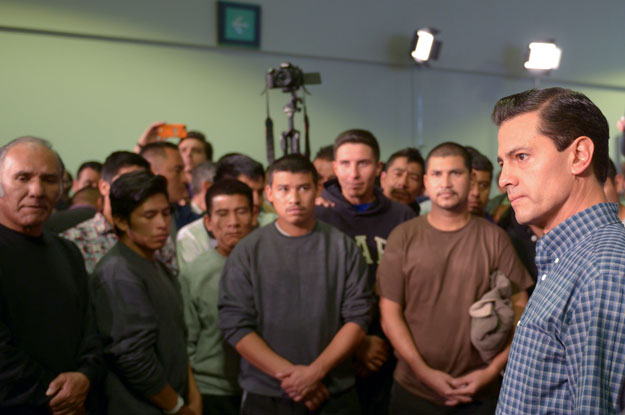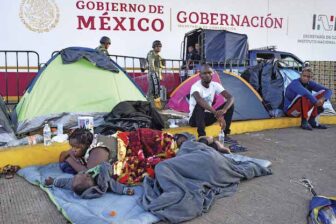Mexico’s Congress is scrambling to prepare for a possible wave of deportations from the United States. Lawmakers are currently debating two initiatives aimed to help the country manage the reintegration of hundreds of thousands, and possibly millions, of returning Mexican nationals – and benefit from the skills they obtained abroad.
On Feb. 28, Mexico’s Senate approved a reform to the country’s education law that would recognize studies completed outside the country, making it easier for newly arrived students without official documentation or transcripts to enroll in school and transfer academic credits. The reform is not limited to Mexican citizens, but could particularly benefit “dreamers”– young people who were brought to the U.S. as children and face uncertain futures as a result of their legal status.
Senator Juan Carlos Romero Hicks, president of the Senate’s education committee, told AQ that the threat of mass deportations under President Donald Trump was a key reason the reform gained momentum in recent weeks. Introduced directly to Congress by President Enrique Peña Nieto on Jan. 31, the reform passed with the support of 107 senators, with just one senator voting against. It must now be passed by the Chamber of Deputies within a month.
Meanwhile, the Chamber is also debating the country’s first Return Migration Law, which would create an institutional framework for the protection and reintegration of migrants who return to Mexico either voluntarily or through deportation. If passed, the legislation, which was introduced by National Action Party lawmaker Arlette Muñoz Cervantes on Feb. 21, would task the government with connecting returning migrants to health and education resources, and assisting them in accessing formal employment.
To finance those obligations, the initiative proposes the creation of a Return Migration Fund. According to a draft of the legislation supplied to AQ, the fund would draw on assets seized from foreigners deported from Mexico for committing a crime.
Muñoz told AQ that a law specifically for return migrants is needed given the unique challenges faced by individuals like Guadalupe García de Rayos, an Arizona mother who was deported on Feb. 8 after living in the U.S. for nearly two decades. For many like her, returning to Mexico means returning to a country that is no longer – or never was – home.
“Unlike those deported under former President Barack Obama, (deportees under Trump) will have deeper roots in U.S. society and fewer and weaker ties back to Mexico. They’re more likely to have lived here for over a decade, and more likely to have U.S. citizen kids,” Shannon O’Neil, the senior fellow for Latin American studies at the Council on Foreign Relations, told AQ.
The possibility of an increase and change in the demographics of deportation under Trump has Mexican authorities looking for new ways not just to reintegrate return migrants, but to benefit from the arrival of those who, in their time in the U.S., have picked up skills and resources that could give Mexico’s economy a boost.
“Between 20 and 25 percent of the people that are returning have money and want to invest in Mexico. As a group, these people contributed over $22 billion a year into Mexico for the last decade,” said Aracely Garcia-Granados, executive director of Mexicans and Americans Thinking Together (MATT), a binational immigrant integration organization that consulted Senator Muñoz on the Return Migration Law. “We can’t see them just as this vulnerable population. They want to work, and they are the best of the best.”
In addition to the pending legislation, Mexico’s government has an existing reintegration program aimed at tending to returned migrants. In 2014, Mexico’s National Immigration Institute launched Somos Mexicanos (We Are Mexicans), an initiative that helps new arrivals get settled, access employment and navigate government bureaucracy – a crucial lifeline for many returnees who lack official papers after spending years abroad.
Dalia Gabriela García Acoltzi, the program’s national director, said that she has yet to see a surge in deportations, but that the number of voluntary repatriations has risen.
“It’s something that’s really uncertain for everyone,” García told AQ, “But regardless, as a government we are prepared to receive them and attend to them, which we’re already doing and have been doing for years.”
Still, some migrant advocates are skeptical of the government’s preparations for a surge in deportations. Father Pat Murphy, who has run the Casa del Migrante shelter in Tijuana for nearly three decades, said the government could be doing more to help.
“I still don’t think they’re talking to the people who do the work, they’re just making their own plans in isolation,” Murphy told AQ. “They have some good ideas, but, for example, I haven’t heard one word about where we’re going to house the people if they start coming in big numbers.”
Murphy said his shelter is at capacity, strained by last year’s arrival of thousands of Haitian migrants hoping to gain asylum in the U.S. Many have decided to stay in Tijuana since the U.S. resumed deportations of Haitians toward the end of 2016.
“We’re suited for 150 people, we could go up to 170,” Murphy told AQ. “And then the government’s going to have to do something.”
Murphy, however, remains optimistic, given the generosity he said he’s seen shown toward migrants by Tijuana residents and businesses. Others echoed the sentiment that, despite the present challenges, Mexicans will rise to the occasion.
“Is Mexico ready? I think Mexico is ready,” Garcia-Granados, from MATT, told AQ. “we just need to bring the private sector on board and to educate the government, and things will be OK.”
—
O’Boyle is an editor for AQ









